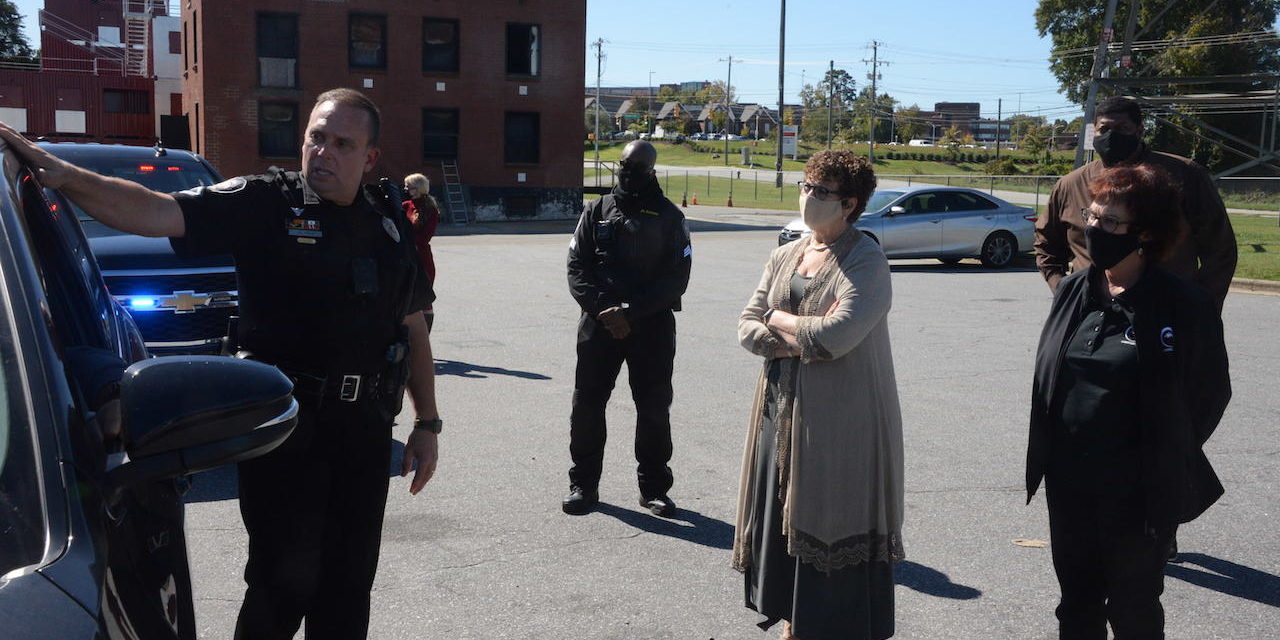The Greensboro City Council is currently in the process of learning more about the Greensboro Police Department and how it operates.
At the urging of Councilmember Marikay Abuzuaiter, a number of sessions have been set up for councilmembers to take mini-classes in different police procedures at the Public Safety Training Facility on Church Street.
Wednesday, Oct. 14, Abuzuaiter and Councilmember Tammi Thurm participated in a class that could have been called, “Everything you always wanted to know about traffic stops, but were afraid to ask.”
Officer Brian Price, who has served with the Greensboro Police Department for 28 years, gave the presentation, which began with the reasons for a traffic stop all the way through to having the councilmembers watch a simulated traffic stop in the Police Training Center parking lot and then try it themselves.
Price said that the reason for a traffic stop is either that the officer has reasonable suspicion or probable cause that a crime has been or is about to be committed. Reasonable suspicion is a lower standard than probable cause, but an officer has to be able to articulate the basis for that reasonable suspicion.
Price noted that there are no quotas for stopping cars or writing tickets and no bonuses either.
Abuzuaiter and Thurm were asked about times they had been stopped by police officers and how they felt. Both expressed varying degrees of anxiety.
Price said, “That anxiety is on both sides.” He said that an officer making a traffic stop never knows what they are going to encounter when they approach the vehicle, but that the primary goal of the officer is to ensure his own safety and the safety of everyone involved.
Price said he always introduced himself, gave the driver the reason for the stop and asked for their license and registration. He said North Carolina law requires the drivers to produce their driver’s licenses during a traffic stop.
Thurm asked about the legality of people who have been stopped video taping the incident.
Price said, that as far as legality goes, “It’s 100 percent.” He added that he didn’t have any problem with the driver or passengers video taping the stop because his body worn camera was video taping the stop, also.
Not only does the officer’s body worn camera automatically activate when the officer turns on the lights and siren, the body worn cameras of any other officers at the scene also automatically activate and the police car itself also has two cameras that activate.
So whether the person in the car videos the incident or not there is a lot of video being shot.


Greensboro police should be careful. Anyone they pull over for speeding could have an illegally concealed handgun. Maybe even one that was illegally purchased and untraceable.
A citizen could get in huge legal trouble from a traffic stop like that. Abuzuaiter should be an expert from dealing with her husbands traffic stop where he was speeding in a 35 mph zone with an illegally concealed, illegally purchased handgun a few years ago after she was on city council. Maybe she could share information on how to get pulled over and charged with very serious gun related charges and then have those charges evaporate because , you know ….Greensboro.
That’s not a Greensboro thing, that’s an America thing. People of power aren’t held responsible.
That’s why I’m an anarcho-capitalist.
Ah yes, the truth. I believe that was even published by this very paper when it occurred.
The case was dropped because there was a valid, legal receipt for the firearm.
Well Marikay at least you seem to be paying attention.
Nailed it.
There was a valid receipt for the purchase of the firearm. Nothing “evaporated”. Everything went through the legal process and protocols.
While that likely is very true, Marikay, the outcome also likely would have been vastly different if it weren’t for your (and his) socioeconomic status. It’s nice that the law works FOR you, but the system often works AGAINST others.
*My use of others is intentional.
Getting out of a ticket should be easy. Just tell the officer that you are engaging in a “mostly peaceful protest.”
Mrs Abuzuaiter is a hypocrite in many ways. She loves to demonstrate her saintliness by agitating for a $15/hour minimum wage for city employees, but when she ran her own business she paid LESS than minimum wage to her restaurant’s employees.
It’s easy to be a saint by spending other peoples’ money, isn’t it dear?
Look up the amount of restaurants that went out of business in San Francisco because of this “price floor on labor”. Anyone who advocates minimum wage has probably never heard of Thomas Sowell.
Look at Walter E Williams’s trip to South Africa and what he wrote about the minimum wage.
It just hurts the people it’s supposed to help.
0 hours of 15/h = 0 which is also not a living wage.
The Greensboro City Council thinks they are smarter than anyone else in town and can advise ALL the departments how to run everything better than everyone who is trained for their jobs. Maybe they can give GOD advice on how to turn the earth better too!!! They voted themselves in office for a second term, how is this legal and why do the citizens of Greensboro let these people get away with this behavior. They are a disgrace to our town.